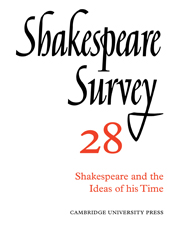Book contents
- Frontmatter
- ‘Richard II’ and the Realities of Power
- The Politics of Corruption in Shakespeare’s England
- Literature without Philosophy: ‘Antony and Cleopatra’
- Self-consciousness in Montaigne and Shakespeare
- ‘Measure for Measure’: The Bed-trick
- Shakespeare and the Doctrine of the Unity of Time
- ‘Coriolanus’ and the Body Politic
- ‘Titus Andronicus’, iii, i, 298–9
- ‘The Merchant of Venice’ and the Pattern of Romantic Comedy
- The Integrity of ‘Measure for Measure’
- ‘To Say One’: An Essay on ‘Hamlet’
- ‘The Tempest’ and King James’s ‘Daemonologie’
- Sight-lines in a Conjectural Reconstruction of an Elizabethan Playhouse
- The Smallest Season: The Royal Shakespeare Company at Stratford in 1974
- The Year's Contributions to Shakespearian Study 1 Critical Studies
- 2 Shakespeare’s Life, Times, and Stage
- 3 Textual Studies
- Index
- Plate section
Literature without Philosophy: ‘Antony and Cleopatra’
Published online by Cambridge University Press: 28 March 2007
- Frontmatter
- ‘Richard II’ and the Realities of Power
- The Politics of Corruption in Shakespeare’s England
- Literature without Philosophy: ‘Antony and Cleopatra’
- Self-consciousness in Montaigne and Shakespeare
- ‘Measure for Measure’: The Bed-trick
- Shakespeare and the Doctrine of the Unity of Time
- ‘Coriolanus’ and the Body Politic
- ‘Titus Andronicus’, iii, i, 298–9
- ‘The Merchant of Venice’ and the Pattern of Romantic Comedy
- The Integrity of ‘Measure for Measure’
- ‘To Say One’: An Essay on ‘Hamlet’
- ‘The Tempest’ and King James’s ‘Daemonologie’
- Sight-lines in a Conjectural Reconstruction of an Elizabethan Playhouse
- The Smallest Season: The Royal Shakespeare Company at Stratford in 1974
- The Year's Contributions to Shakespearian Study 1 Critical Studies
- 2 Shakespeare’s Life, Times, and Stage
- 3 Textual Studies
- Index
- Plate section
Summary
Major claims have been made both for and against Shakespeare as a man of ideas – of his own time and for all time. These point to larger doctrines about the relation between literature and philosophy. In this paper I shall consider Shakespeare as a dramatist of ideas and his contributions to philosophy in literature.
Philosophy and Literature, Philosophy of Literature, and Philosophy in Literature have only one thin in common: each has been designated a non subject. Of course this is a slight exaggeration, since it is true of the first two but not of the third. Philosophy and Literature is a piece of academic entrepreneurism, motivated by the mutual desire to make philosophy concrete and literature profound. It succeeds in neither. At best, it functions as a part of the history of ideas, using both literature and philosophy as reflecting mirrors of each other; at its worst, it is a series of distorting imitations of imitations, to borrow a phrase from the master.
Philosophy of Literature is a piece of philosophical imperialism, sponsored by the obsession that all disciplines have a philosophical dimension that awaits articulation and scrutiny. All that deserve examination, however, are those aspects of literature as an art that distinguish it from the other arts. Traditionally, aesthetics has regarded this problem of the differentia of literature as its proper domain. I see no need to recast or to reject this traditional role and discipline: there is nothing in philosophy of literature that is not already in aesthetics.
- Type
- Chapter
- Information
- Shakespeare Survey , pp. 29 - 36Publisher: Cambridge University PressPrint publication year: 1975
- 1
- Cited by

